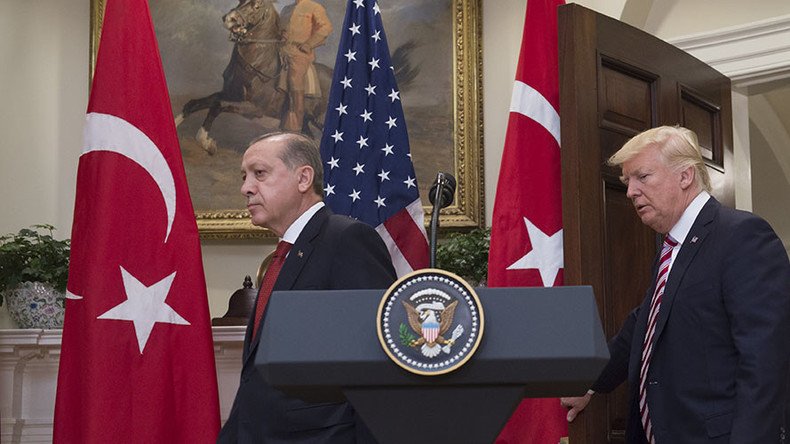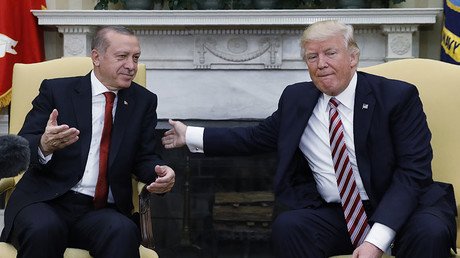Gulen & Kurds core issues behind Turkey-US rift, not consulate worker’s arrest – analysts to RT

The recent Turkey-US spat over the detention of a US consulate staffer by Ankara and Washington's suspension of issuing visas in Turkey should be regarded within “a broader context of [the] conflict” between the two nations, international analysts have told RT.
While “relations are certainly not good at the moment,” the two NATO allies have for long been at odds with regard to both their domestic and foreign policies, the analysts say.
Washington’s refusal to extradite cleric Fethullah Gulen, differing approaches to the Kurdish question and contrasting attitudes when dealing with Moscow have been among the sticking points.
Ankara ‘pressures’ Washington to extradite exiled Turkish cleric
“Underlying the conflict with the US is Turkey’s adamant demands to have the US extradite Fethullah Gulen to Turkey for his alleged masterminding” of the failed coup in the country in 2016, journalist and author Richard Peres told RT.
Assuming that “the tit-for-tat regarding visas is meant to put pressure on the US” in an attempt to have the cleric eventually extradited, Peres pointed out that he doubted that events would unfold according to Ankara’s objectives.
“It seems that the Turkish government does not understand that the US has a judicial process for extradition and that it is not up to the President of the US to kick people out of the country without going through that process,” he pointed out.
The Gulen issue, being one of the main points of contention between the two states, has also been emphasized by journalist and campaigner with Peace in Kurdistan, David Morgan.
“The US has refused Turkey’s demands to extradite Gulen claiming that there is not enough evidence of his involvement [in the coup]. The current diplomatic crisis between Turkey and America is tied up with Gulen,” Morgan told RT, adding that “the rift will not be resolved until something is done about Gulen.”
Faruk Logoglu, a former Turkish ambassador to US and current President of the Eurasian Strategic Studies Center (ASAM), a leading think tank in Turkey, also honed in on the Gulen matter as one of the main challenges to a normalizing of relations between the NATO allies.
“There has been an accumulation of a lot of unresolved issues in Turkish-American relations in recent years. One concerns the US failure to extradite Fethullah Gulen,” Logoglu told RT. He added that “the detention of the consular worker must be viewed not as the cause” of the recent row, but rather as the “last straw that broke the camel’s back.”
Turkey sees US-supported Kurds as ‘immediate threat’
“Differences over Iraq and Syria and Turkey's rapprochement with Russia, as well as Iran are other issues that trouble the relationship between the two allies,” the former senior diplomat outlined.
“A particularly volatile issue is the continued backing by the US of PYD/YPG in Syria that Turkey regards as a terrorist organization,” he said.
#Turkey & #Iran unite against #KurdishReferendum and accuse #Mossad of meddling https://t.co/EhZI0wT9Va
— RT (@RT_com) October 5, 2017
The issue of the People’s Protection Units (YPG) in Syria, which Ankara perceives as terrorists and Washington considers a key component of the ground force fighting Islamic State (IS, formerly ISIS/ISIL) in the region, has greatly contributed to the current crisis, believes Morgan.
Pointing out that Ankara perceives the Kurdish forces in Syria as an “immediate threat,” he explained that “Turkey’s leaders fear the impact of any Kurdish successes in Syria on the Kurds inside Turkey.”
“They worry that this will awaken Kurdish nationalistic aspirations in the southeast and these will be exploited by the PKK [Kurdistan Workers Party] which Turkey sees only as a terrorist organization and not as a political movement with mass support.”
Peres agreed that the “final reason underlying the conflict is American support for the Syrian Kurdish forces in northern Syria in their joint fight against ISIS. Turkey does not like that.”
Ankara ‘doesn’t fall for West’s anti-Russia crusade’
In addition, there has also been a different approach by Ankara and Washington to Moscow being an international player, analysts say.
Turkey lists US planes & missiles that Russian-made S-400 SAMs ‘can eliminate’ https://t.co/ovkgbzIJ3hpic.twitter.com/lbcEJGil1p
— RT (@RT_com) September 22, 2017
While the West, according to Morgan, has been “fabricating anti-Russian sentiments and ordinary people fail to see why their leaders keep banging on about Russia all the time,” Turkey “does not fall for the current anti-Russia crusade and is more open to forging new alliances especially when its relations with traditional western allies grow ever strained.”
Turkey spat is ‘low priority’ for Trump administration
However, “it is important not to exaggerate too much the depth of divisions,” Morgan added, almost echoing Turkish Deputy Prime Minister Mehmet Simsek’s latest statement that the visa spat is “overblown” and will likely be resolved soon.
“A lot of it is rhetoric and political theater of which Erdogan is a master. Trump always speaks warmly of Erdogan too. Relations may be strained but they are not a breaking point just yet.”
The US, has up to this point, taken “little action against Turkey,” Peres said. “Until the arrest of one of its consulate workers, the US has essentially done nothing to combat the massive purges of public sector workers and arrests [in Turkey] under the pretext of [them] being members of a terrorist organization allegedly supportive of last year's attempted coup.”
‘We’re not a tribal state’: Turkey slams US visa suspension, vows retaliation https://t.co/rWJZkQ3S8Tpic.twitter.com/ofDQjJy0XS
— RT (@RT_com) October 10, 2017
“Even with some American citizens having been arrested and caught up in the purges,” Trump recently still expressed support for Erdogan, he said.
Trump “seems indifferent to the fact that Erdogan is using the attempted coup to repress all opposition in Turkey,” he said, pointing out that the current “conflict seems to have a very low priority with the Trump administration, which seems to not be bothered whatsoever with the repressive domestic tactics of its global 'friends'.”













